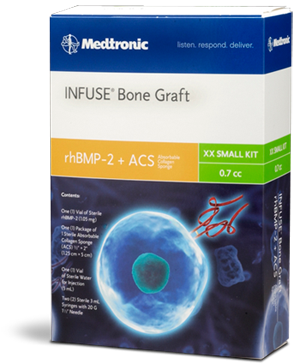INFUSE® Bone Graftsynthetic proteins that help grow new bone
From 2002 to 2011, more than 1 million patients had used INFUSE Bone Grafts to address issues with lumbar and spine pain. After the risk-benefit profile was questioned, Medtronic – the maker of INFUSE Bone Graft – commissioned a $2.5 million dollar study to address concerns with the device being connected to male sterility, infections, and cancer.

What is INFUSE® Bone Graft?
INFUSE Bone Graft identifies and sparks bone-forming cells to induce the formation of new bone or heal existing bone. Bone morphogenetic protein-2(rhBMP-2) is present in the regeneration process and is known to help increase cellular response with the count of receptors on the surface of the cell.
In 2002, the Federal Drug Administration (FDA) approved the INFUSE Bone Graft in limited use in spine, lumbar, and some dental procedures. According to Joanne Wuensch at BMO Capital Markets, “It became the magic sprinkle powder in orthopedic and spinal surgeries, and other operations throughout the body.” Medtronic, the maker of INFUSE Bone Graft has had tremendous sales and in one year made over $700 million, according to company representatives.
Allegedly, Medtronic advised physicians to use INFUSE Bone Grafts in off-label surgeries which helped to grow sales exponentially. Off-label is where a drug or device may be prescribed or used other than for the uses approved by the FDA. Harlan Krumholz, a Yale University professor in charge of an INFUSE study stated, “There is a tremendous amount of uncertainty about the benefit it provides and how safe it is.”
A review of 2000 patients and 17 spinal cases by Oregon Health & Scienes University found INFUSE to be close to bone grafts in overall success rates and risks when used for lumbar infusion. For other types of surgery, INFUSE patients had increases in retrograde ejaculation, nerve pain caused by bone spurs, urogenital issues, and wound complications.
Adverse Events for the INFUSE Bone Graft
The U.S. Food and Drug Administration (FDA) regulates over-the-counter and prescription drugs in the United States, including biological therapeutics and generic drugs. This work covers more than just medicines. For example, fluoride toothpaste, antiperspirants, dandruff shampoos and sunscreens are all considered drugs.
An adverse event is submitted to the FDA to report any undesirable experience associated with the use of a medical product in a patient. For drugs, this includes serious drug side effects, product use errors, product quality problems, and therapeutic failures for prescription or over-the-counter medicines and medicines administered to hospital patients or at outpatient infusion centers.
Regarding more information related to this product please check out this link to the FDA website.
INFUSE Bone Graft Lawsuits
Since 2011 several lawsuits have been filed against Medtronics, including several from previous employers regardind physician incentives. Eugeen Caaggee, MD oversees spine surgery at Stanford University and editor-in-chief of the Spine Journal believes the that these cases could speak for “a whole lot of people” in a review it posted. For more information regarding the Spine Journals published artilce see this article.
We want to hear from you
Speak with a representative now
Phone: (888) 430-5470
Email: [email protected]


